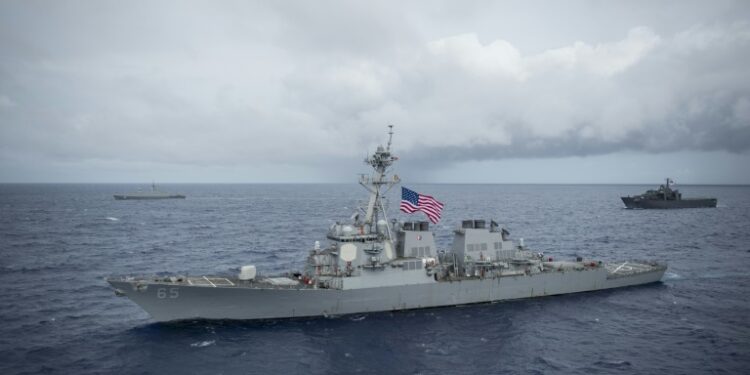Agencies-Gaza post
China condemns passage of US navy through Taiwan Strait
China on Wednesday condemned Washington as a “peace destroyer” in the Taiwan Strait, following the latest in a series of corridors for U.S. warships through the waterway.
Beijing considers Taiwan part of its territory that will one day be recaptured – and the narrow water surface separating the island from mainland China is a flashpoint between the two sides.
Contrary to Beijing’s position, the United States and other countries see the Strait as part of international waters and therefore open to all, and this year an American warship crossed the road almost every month.
On Tuesday, the Arley Burke-class destroyer USS Benfold made a routine crossing of the Taiwan Strait… “Across international waters,” the 7th U.S. Fleet said in a statement.
“The ship crossed through a passage in the strait outside the territorial sea of any coastal State.”
China’s Eastern Theatre Command said on Wednesday it had deployed naval and air forces to “follow and monitor the entire operation.”
“Repeated US provocations and reviews fully demonstrate that the US is a destroyer of peace and stability in the Taiwan Strait and a risk maker,” said US spokesman Colonel Xi Yi.
The Chinese forces had always been “on high alert to firmly protect national sovereignty and territorial integrity”.
Taiwan’s defence ministry said it had closely monitored the passage of the destroyer and the “normal situation.”
In June, Taipei clashed with Beijing over the latter’s reaffirmation of its position that the Strait is not international waters, accusing China of trying to jeopardize regional peace with its territorial demands.
British, Canadian, French and Australian warships have passed through the Taiwan Strait in recent years, sparking protests from Beijing.
The passage of USS Benfold on Tuesday coincided with the visit of former US Defense Secretary Mark Esper to Taiwan, who described Taiwan as a “good friend we must support and defend” during a meeting with President Tsai Ing-wen.
Esper said it was time for Washington to “move away from strategic ambiguity” over whether to intervene militarily on behalf of Taiwan.
The “strategic ambiguity” was “the longstanding policy of the United States on Taiwan, designed to stave off Chinese invasion and discourage the island’s territory from formally declaring independence.

















